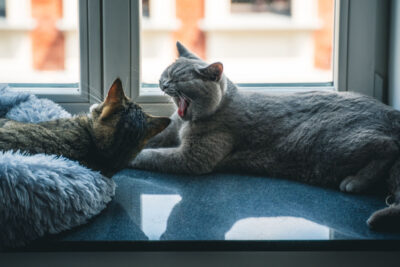-
Shop By Age
-
Kitten
Up to 1 year
-
Adult
1-6 years

Cats hissing at each other – Is it normal?
Is it a snake? Is it a kettle? Is it a punctured tyre? No, it’s your cat! Pet parents might often find their felines ‘hissing’ at a fellow fur baby.
29/02/2024
2 min read
Is it a snake? Is it a kettle? Is it a punctured tyre? No, it’s your cat!
Pet parents might often find their felines ‘hissing’ at a fellow fur baby.
It might be a sibling in a multi-cat household that is doing/has done something to irk its brother or sister.
Or it could be another four-legged friend who is being introduced to the confrontational kitty for the first time.
This behaviour, alongside some light/playful swatting, is very common and perfectly normal.
But it is always worth keeping an eye on things to see how the situation plays out.

7 reasons why cats will hiss at each other
Hissing is an expression of anxiety, fear, distress or discontent. It’s more of a defence mechanism rather than a method of aggression or intimidation. Some of the main causes of a cat hissing include:
- Territory: Cats are notoriously territorial animals and they’ll defend and protect their property with gusto. Hissing is a natural tool of communication to establish boundaries. Therefore, one feline might vocalise when another cat is threatening to trespass.
- Introductions: First impressions count! Introducing a new cat to the household, or introducing two cats to each other, can take some time and adaptation. Pet parents need to be patient and persevere as this procedure isn’t always plain-sailing. Hissing is typical as they become acquainted and try to establish a hierarchy.
- Guarding: Pets are possessive, whether it’s a cat or otherwise. As well as protecting territory, they’ll also defend their resources. Hissing can be a defensive response to let a fellow four-legged fur ball know that their food bowl, toys or bed is out of bounds.
- Fear: Cats may hiss if they feel threatened, frightened or intimidated by another cat’s behaviour. It’s a way to inform the perpetrator to ‘back off’ and give them some space.
- Protection: A mother’s natural instinct is to protect her litter. Anyone or anything that might threaten to compromise the safety of her kittens will likely feel her wrath. If another cat or, indeed, a human gets too close, they’ll be warned to take a step back by way of a ‘hiss’.
- Unfamiliarity: An unrecognisable situation, an unfamiliar environment, a disturbing noise, an unpleasant sight, or an unusual smell can get a cat’s back up. On occasions that your four-legged friend appears to be hissing at nothing, it might just be due to one of the above.
- Pain: If your fur baby is ill or suffering from physical pain then their hissing might be a cry for help. Should they vocalise when petted, when you attempt to touch them, or if their hissing becomes more persistent, then ring your veterinarian to book an appointment and have them checked out.
Is a ‘normal’ amount of hissing expected?
Hissing in cats can often be misconstrued as a sign of animosity or hostility.
However, it is actually a way of expressing fear and communicating their discontent at a certain situation.
There is nothing for pet parents to be alarmed about if their kitty showcases a ‘normal’ amount of this behaviour.
It’s to be expected if a new cat is introduced to a multi-cat household or if two unfamiliar cats are introduced.
Their human companions will naturally have their own reservations when introduced to strangers.
That feeling of apprehension and uncertainty would be driven home 10-fold if somebody they didn’t know was brought into their home.
Those initial fears will be allayed, though, once cats become more familiar with each other and establish boundaries and a hierarchy.
It’s important to monitor their behaviour and interactions during this time of transition.
If hissing is occasional and doesn’t look as though it will escalate into physical aggression then it’s okay to leave them to it.
But if it intensifies, tensions are mounting, and it leads to excessive swatting, then an intervention is required.
Cats have unique personalities, and some are more combative than others, but belligerent traits may indicate underlying issues that need to be addressed.
My cat is hissing at me consistently – should I be worried?
Targeted and frequent hissing will sound alarm bells for pet parents.
And rightly so, as constant hissing could be a sign of underlying issues or discomfort.
Their consistent cries might be due to medical conditions that aren’t visible to the naked eye.
It might be because they’ve become extremely possessive of a certain toy or resting spot.
They might take their displeasure out on you if you’ve introduced changes to their environment or routine.
Or the pain and discomfort of illness or injury could be the reason behind their constant vocals.
In these circumstances it pays to observe your cat’s overall behaviour and demeanour.
This might help you pinpoint the issue, which can then lead to a diagnosis.
However, if the hissing persists or is accompanied by other concerning attributes, then it’s time to seek help.
A veterinarian or a professional animal behaviourist can help identify the root cause and provide guidance on how to alleviate your cat’s distress.
Patience is key
As a pet parent your goal is to create a harmonious and hospitable environment where animals and their human companions can co-exist peacefully.
Introducing a new cat to the household can feel like an uphill battle at times and there will be numerous hurdles to overcome.
But a gradual and patient approach, which allows all felines ample time to adjust to the change, will eventually bear fruit.
The hissing might continue as they establish a pecking order and an understanding of boundaries, but it’s an innocent and natural means of communication that often won’t get out of hand.
Cats hiss for a number of reasons, many of which aren’t exactly a cause for concern.
However, if their behaviour alters, and their cries become more frequent, it’s a good idea to consult with a veterinarian or a professional animal behaviourist.
They will be able to provide guidance and strategies to help reduce tension and promote a more amicable atmosphere among your feline family.
For related articles you may also enjoy:







